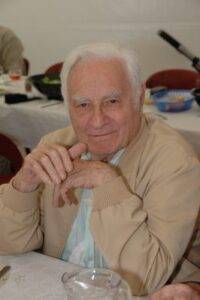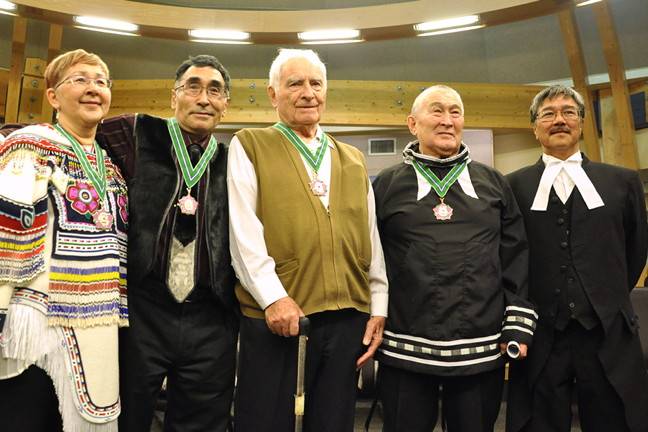Father Robert Lechat remembered for devotion to his Inuit parishioners
Order of Nunavut recipient, Lechat died March 29 at 102
Pictured left: Father Robert Lechat (centre) was awarded the Order of Nunavut for his work to preserve the Inuktitut language, in 2015 (Photo courtesy of Lorraine Brandson)
Louis Tapardjuk remembers Father Robert Lechat as a priest who “encouraged Inuit to take control of their own church.”
An Inuit parishioner from Igloolik, Tapardjuk said Lechat was unlike other Roman Catholic priests who have been a part of the community, many of whom stuck to the tradition of the church and teachings in the Bible. Lechat, he said, worked to bring the community together.
“He looked forward to living with the Inuit community and he chose Igloolik for his service [because of that],” Tapardjuk said.
Lechat died in Richelieu, Que. on March 29. He was 102 years old.

Father Robert Lechat arrived in Canada with the Roman Catholic church in 1947, working in the Nunavik communities of Quartaq, Kangiqsujuaq, Umiujaq, and Kuujjuaq. (Photo submitted by Lorraine Brandson)
Born in France in 1920, Lechat arrived in Canada with the Roman Catholic church in 1947, working in the Nunavik communities of Quaqtaq, Kangiqsujuaq, Umiujaq and Kuujjuaq. In 1972, he moved to the Churchill-Hudson Bay Diocese, which includes most of what is now Nunavut.
Igloolik was Lechat’s first parish in the territory and the place he served the longest. He worked in the community and in Sanirajak from 1972 to 1995.
Joanne Tompkins, a professor at St. Francis Xavier University in Nova Scotia, remembers Lechat as a mentor and friend.
She met him in Sanirajak in 1987. Tompkins, then a principal at the Arnaqjuaq school, said Lechat helped improve her understanding of Inuit and their culture and history.
“He had a deep knowledge and deep appreciation for Inuit people and so was a really good role model for myself and other non-Inuit people who were working in the cross-cultural context,” she said.
He also stood against the ongoing harm being done to Inuit by governments at the time.
In the 1970s, Lechat took up the cause of stopping the illegal sterilization of Inuit women in the North by some provinces. A product of the eugenics movement, the practice of sterilization attempted to limit reproduction of people deemed to be “unfit,” and increasingly targeted Indigenous women.
“He was against [sterilization because] he always said Inuit people love children … that’s how they survive, that’s how they see love, and that’s how they have hope,” said Bishop Anthony Krotki, who lived with Lechat from 1991-1993. “He saw that the government decided that women will be sterilized, and was so upset.”
An inquiry conducted by the federal government in 1976 found that from 1966 to 1976, hundreds of sterilizations were performed on Indigenous women from 52 Northern settlements.
Krotki said Lechat wrote to governments and local publications, criticizing forced sterilization of Inuit women. While the laws were eventually repealed in the mid-1970s, Krotki said he will always remember how Lechat fought for women.
Fluent in Inuktitut, Lechat also wrote or contributed to the publication of more than 70 scriptural and liturgical materials, including a publication of the Old Testament and the main missal book used by the congregations on Sundays.
A proponent of Inuit, he encouraged his first Inuktitut language teacher, Mitiarjuk Nappaaluk, in Nunavik to write Sanaaq, the first novel written by an Inuk.
Lechat’s efforts to preserve Inuktitut were recognized by MP Nancy Karetak-Lindell in the House of Commons in 2002. In 2015, he was awarded the Order of Nunavut for this work.
Nominated by elder Leonie Kunnuk, from Igloolik, Lechat was applauded for “his contributions to preserving the Inuktitut language through extensive translation … his unwavering belief and support of Inuit leadership in both the Roman Catholic church and Northern society, and for his wisdom and respectful attitude towards the Inuit and their desire to empower themselves in their homeland.”
More recently, Lechat lived in Ottawa and made regular visits to Nunavut parishioners who arrived for medical care. During that time, he continued to support the Northern missions during Christmas and Easter, travelling to the Kivalliq and Igloolik/Hall Beach areas where he had previously ministered.
“Though he was very old, he was still able to have young ideas and he was still able to be curious,” Tompkins said.
She added “he was hugely compassionate … present in many births and deaths and accidents and tragedies — always supporting the community.”
By Meral Jamal
Published on the Nunatsiaq News website


